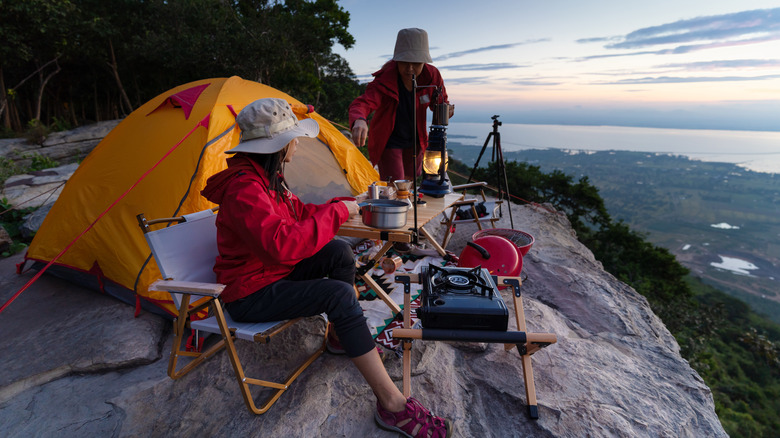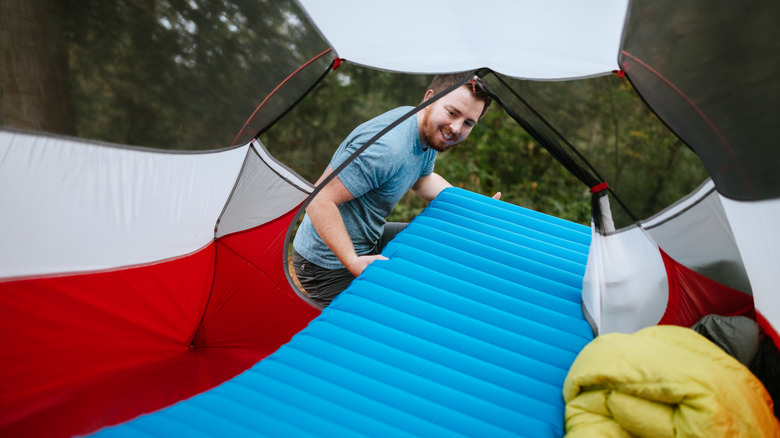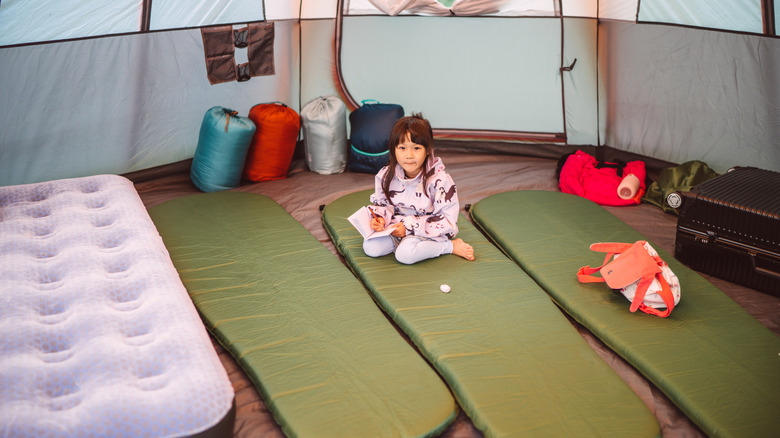Upgrade Your Camping Gear With This Game-Changing Item For A Much Sounder Sleep In Nature
Camping is a wonderful way to immerse yourself in nature, but isn't without challenges. If you've ever spent a night tossing and turning in your tent, feeling every single piece of lumpy dirt or knobby root, you'll agree that camping isn't always comfortable. The right equipment can make or break your trip. Investing in a few key pieces of camping gear can help make tent camping a lot less intimidating. An insulated sleeping pad should be on your packing list.
Many campers, myself included, have made the mistake of believing that a night or two sleeping on the ground won't be that big of a deal. At most campsites, whether you're in the back-country or at established campgrounds, you aren't going to be able to set up your tent on perfectly soft grass. You'll likely be battling roots, rocks, pinecones, and numerous other small natural features that are bound to irritate you after a few hours on the ground. Plus, the earth will suck the heat right out of your body. According to REI, "when your body contacts the Earth, you open up a conduit for heat loss. And the planet is a lot bigger than you are, so it can suck up all the heat your body can produce."
Sleeping pads target both concerns because they act as a cushion and extra layer of insulation. After your tent and sleeping bag, an insulated pad is the most important thing you can buy. There are plenty of excellent options that will ensure you have no problem sleeping comfortably when camping.
Stay warm and comfortable with an insulated sleeping pad
I found out the hard way that your sleeping setup is something you should absolutely never skimp on when packing for a multi-night campout. During my final year as a university student, I went on a five-night backpacking expedition through the back-country of Nantahala National Forest, where you can camp just steps away from the iconic Appalachian Trail. I was nervous about the weight of my backpack, so I opted to only pack a lightweight sleeping bag. It was early spring, and I thought I'd be just fine.
I couldn't have been more wrong. By our second night, temperatures dropped unexpectedly, and it began to snow. I was unable to sleep a wink because the ground was freezing. I put on every piece of clothing I had packed, took a shot of whiskey, and even piled my backpack on top of myself in an attempt to keep my body insulated. No matter what I did, I was incapable of staying warm and I spent the night shivering and feeling sorry for myself.
Had I simply packed an insulated sleeping pad like everyone else on the trip, I would have been able to stay warm enough to get some shuteye. Instead I had to complete the challenging hike up Black Mountain the next morning completely exhausted, and struggled to make up the sleep deficit for the rest of the week. The trip still had its highlights, but overall was a really difficult experience that left me doubting whether or not I really enjoyed camping. That sleeping pad would've been a complete game-changer. Don't make my mistakes — make room in your backpack for an insulated sleeping pad even if you're expecting mild temperatures.
Choosing the perfect sleeping pad
When selecting a sleeping pad for your camping trip, there are important factors to keep in mind. The first, and probably most important, is going to be the R-Value. The R-Value is a measurement of a sleeping pad's ability to provide insulation. If you're camping in a warm climate, an R-Value between one and three should do just fine. You'll want to consider the season, elevation, and nighttime temperatures when choosing the perfect sleeping pad.
The next important thing to consider is your personal camping style, and the type of trip you're embarking on. Air pads are a great choice for a variety of camping trips. If you're car camping, you might as well take advantage of the extra packing room and choose an extra thick air pad. They're well insulated and super comfy. For a luxurious option, consider splurging on the $400 Zempire Monstabed which has an R-Value of 10.5 and is 16.5 inches thick when inflated. If you and your romantic partner frequently camp together, you might want to consider a double-size air pad and sleeping bag combo. Air pads also come in lightweight and compact styles that are ideal for backpacking. Choose an ultra-light air pad for backpacking trips.
A thick sleeping pad that self inflates is another great way to stay comfy. Self inflating pads are usually made with a layer of foam and when you unroll them they will slowly inflate with air. They make for a fuss-free camping trip, but they're heavier and bulkier than other options. For extended hikes, a closed-cell foam sleeping mat is ideal because they're super durable and lightweight. You won't have to worry about an unexpected hole ruining the sleeping pad or your sleep.


